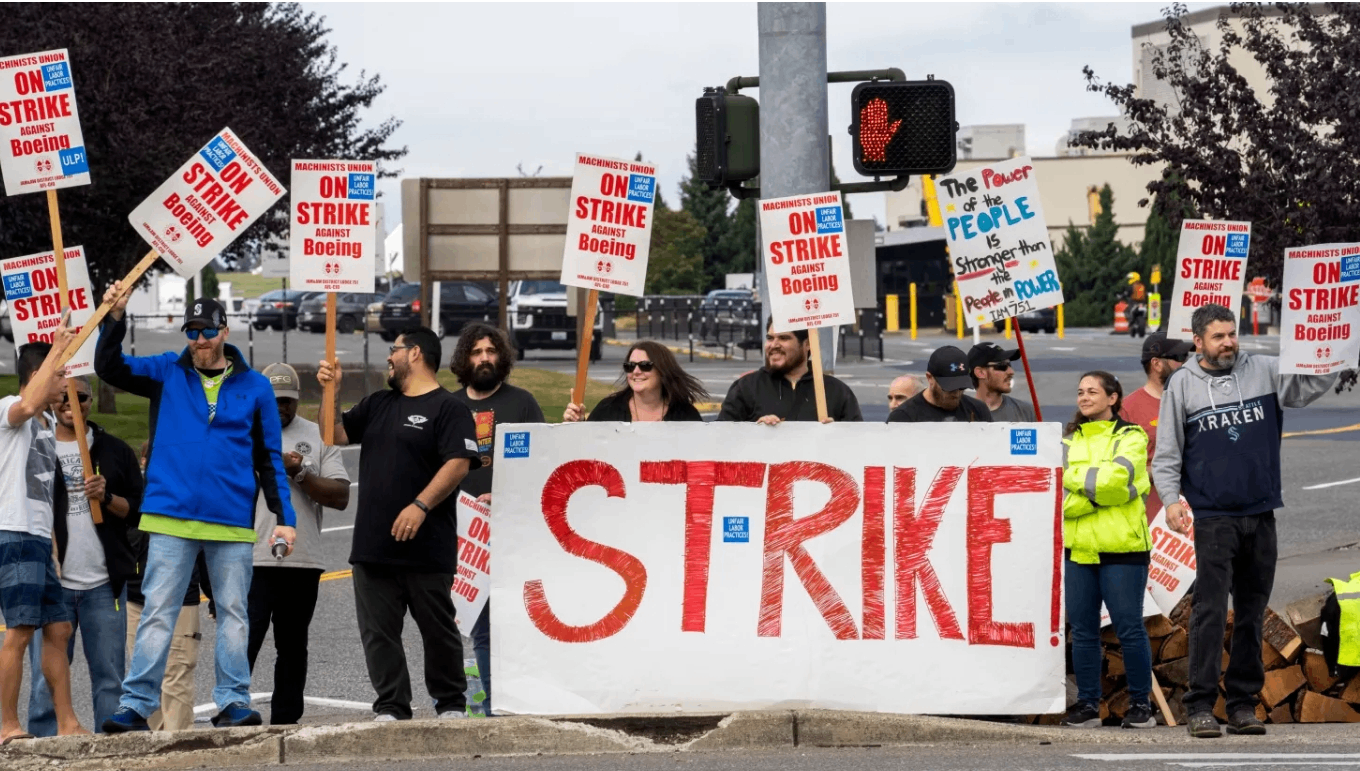罢工仍在继续!波音工会称谈判中止 飞机生产基本停摆
双方的矛盾愈演愈烈。
9月29日,有消息称,波音公司与其最大工会的谈判陷入僵局,因为双方未能就解决罢工问题达成共识。
本次谈判破裂主要的争议点在于波音工人的养老金问题没有取得进展,同时公司在工资增长方面也未给出实质性的回应。国际机械师和航空工人协会宣布,目前没有计划安排新的谈判。
本次波音大罢工已经持续了将近半个月的时间,最早可以追溯至9月8日。当时,波音公司和其最大的工会 IAM 751宣布,就一份新的四年合同达成了初步协议,协议期内工资增长 25% 并承诺在西雅图地区建造波音的下一架飞机。
然而,波音员工以94.6%的投票率反对了这份初步协议,这远远超过了罢工所需的三分之二投票。9月13日午夜,美国西雅图地区和俄勒冈州的3万多名波音员工正式发起罢工。Jefferies 航空航天分析师称,罢工对波音公司造成的30天现金影响可能高达15亿美元。
面对罢工行动,波音在一开始采取了“不退反进”的强硬策略,全面削减员工福利,倒逼罢工结束。9月16日,波音首席财务官布赖恩·韦斯特(Brian West)表示,为了保持现金,波音决定进一步削减运营成本,包括冻结招聘和暂停非必要的员工旅行,直到罢工结束。
9月21日,波音对员工的制裁措施进一步升级。波音CEO凯利·奥特伯格(Kelly Ortberg)宣布,对参与罢工的数千名员工强制执行无薪休假,以弥补罢工给波音造成的每日一亿美元的损失。此外,波音还表示将于9月30日停止支付这些工人的健康保险。
双方的矛盾愈演愈烈。
两天后,波音公司最终“服软”,向罢工人员提出了“最佳及最终”版解决方案,该方案包括了加薪和更高的奖金。波音公司在内部信中称,如果员工在当地时间周五之前接受提议,波音将恢复员工的绩效奖金,提高工人的退休福利,并将批准奖金加倍至6,000美元。
此外,波音的新提议还包括提高员工的基本工资,四年内加薪30%,高于第一个提议中的25%。波音表示,等到四年合同结束时,波音工程师的平均年薪将从现在的75,608美元上涨至111,155美元,这是个不小的提升。
然而,这份方案并没有让罢工工人满意,在他们的最初设想中,员工的基本工资要在3年内增加40%。
今日,波音再次奉上了新的报价。虽然具体细节尚未披露,但是这份报价显然不能让工会满意,双方在基本工资涨幅、养老金涨幅、绩效涨幅等全领域都未能达成一致。本次谈判的破裂,象征着双方本就日趋紧张的关系再次跌入冰点,罢工扔在继续。
媒体评论称,这次罢工将使波音公司商业飞机生产基本停摆,并可能冲击美国经济。如果罢工持续较长时间,几乎遍布美国50个州的近万家波音公司供应商都可能出现问题。
标准普尔全球公司则表示,罢工如果短期内无法结束,可能推迟波音公司业绩复苏并伤及其信用评级。标普和另一家评级机构穆迪给波音公司的信用评级现阶段略高于垃圾级。
近年来,波音公司股价经历了显著的下跌。截至发稿,波音的股价从2019年3月1日的历史最高收盘价430.35美元下跌到了2024年9月26日的收盘价154.58美元。这意味着波音的股价自历史最高点以来下跌了约63.8%。
波音公司自2018年以来再未实现年度盈利,这深深地打击了投资者的信心。

·原创文章
免责声明:本文观点来自原作者,不代表Hawk Insight的观点和立场。文章内容仅供参考、交流、学习,不构成投资建议。如涉及版权问题,请联系我们删除。